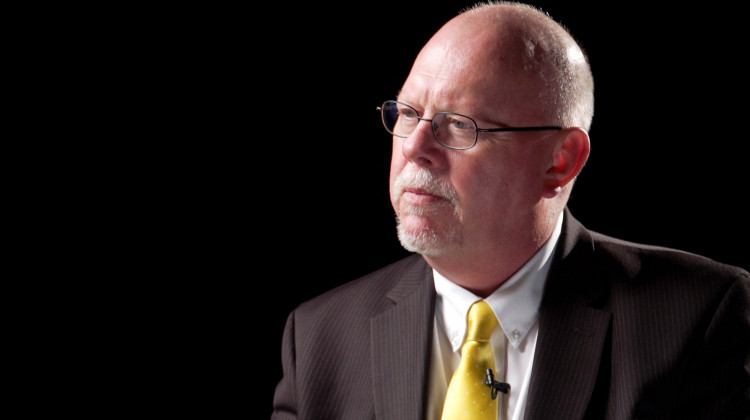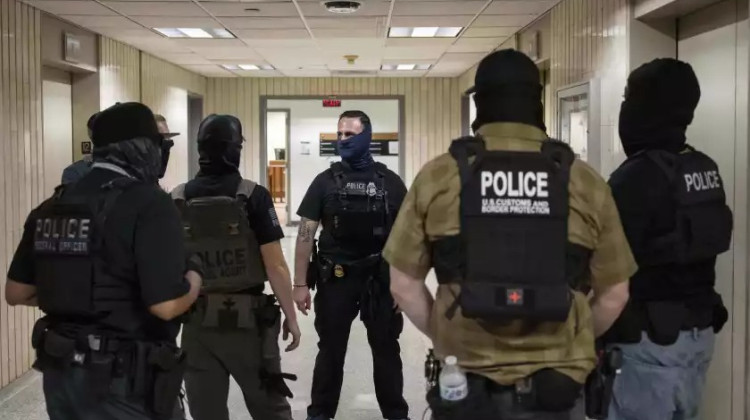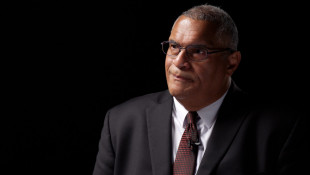
Libertarian gubernatorial candidate Donald Rainwater believes frustration over COVID-19 restrictions could have more voters turning to his third-party candidacy this year.
Alan Mbathi/IPB NewsThe 2020 campaign for Indiana governor – like so much of people’s lives – has been overtaken by concerns about the ongoing COVID-19 pandemic and nationwide protests over racial injustice and police violence. Indiana Public Broadcasting’s Brandon Smith sat down with each candidate to discuss the race's big issues.
Brandon Smith: As a Libertarian, what do you see as the role of government in addressing the pandemic?
Donald Rainwater: Provide the citizens with the information necessary to decide for ourselves how best to safeguard our lives and the lives of our families. I believe that all too often, the idea that government can protect everyone is misguided.
Smith: What about Gov. Holcomb’s response hasn’t worked in your mind? The number of cases as it relates to the number of tests has come down in recent months. He touts those numbers, says it’s clear the response is working. What about it didn’t work for you?
Rainwater: Many, many, almost a million Hoosiers have had to file unemployment claims since the first week of March. We have no idea what the economic ripple impact of the executive orders will be from now over the next couple of years.
READ MORE: Can I Vote By Mail? Here's What You Need To Know For Indiana's Elections
Join the conversation and sign up for the Indiana 2020 Two-Way. Text "elections" to 73224. Your comments and questions in response to our weekly text help us find the answers you need on COVID-19 and the 2020 election.
Smith: The money that’s come from the federal government, primarily by way of the CARES Act, intended for COVID relief – Indiana is still sitting on $1.3 billion of that $2.4 billion we’ve gotten.
Rainwater: And many of the folks who are still unemployed haven’t got unemployment checks because our unemployment insurance system is antiquated. We’re not helping those who were displaced economically by the governor’s unilateral executive orders.
Smith: If you’re governor of Indiana, as you see the problem of racial injustice not just in government but in society in general, what then is the role for government to help address that crisis?
Rainwater: Much of the what we’ll call racial injustice has been government overreach. Here again, whether it was to oppress someone or to attempt to make up for past bad acts, it doesn’t work. You can’t use government to fix something that really can’t be fixed.
READ MORE: What’s Driving This Moment In Indiana: Protest Organizers Discuss Demands For Change
Smith: What role do you see for police reform?
Rainwater: We need to have an honest, straightforward discussion about holding individuals accountable for individuals’ actions. And I don’t think we do that today. I think we all too often want to blame a group of people for one person’s bad actions. I’m a proponent for body cams – I think it protects both the officer and the citizen. I believe that we need to do better training.
Smith: So, education is always a big deal in an Indiana governor’s race. The governor will now appoint the state superintendent of public instruction for the first time, instead of that position being elected. If you’re hiring that state superintendent, what qualifications are you looking for?
Rainwater: Well, I’m looking for someone first of all who has not only been involved in public education but someone who also has experience and knowledge and open-mindedness toward educational choice in Indiana. I believe we unfortunately politicize education entirely too much in the state of Indiana. And we need to focus on making sure that the dollars that Hoosier taxpayers pay for education get to the kids in the classrooms.
Contact reporter Brandon at bsmith@ipbs.org or follow him on Twitter at @brandonjsmith5.
 DONATE
DONATE





 View More Articles
View More Articles


 Support WFYI. We can't do it without you.
Support WFYI. We can't do it without you.